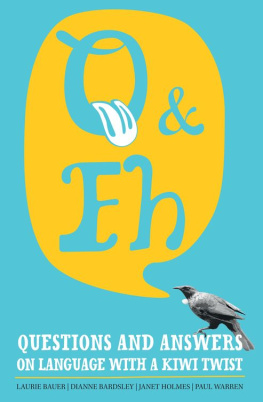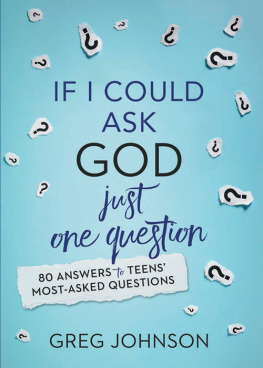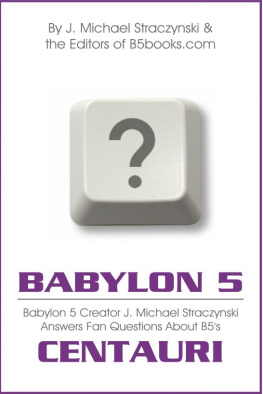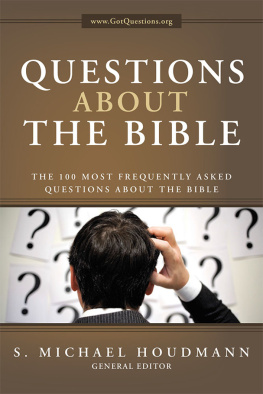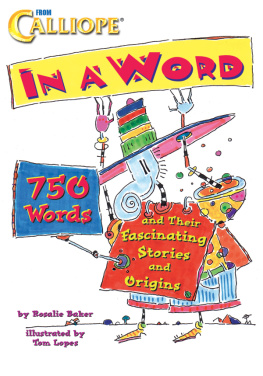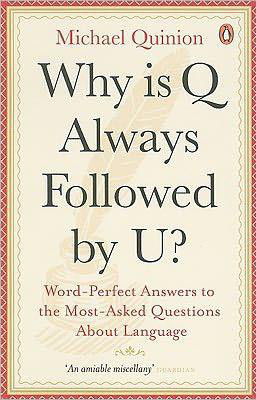Why is Q Always Followed by U?
Word-perfect answers to the most-asked
questions about language
Michael Quinion

PARTICULAR
BOOKS
an imprint of
PENGUIN BOOKS
PARTICULAR BOOKS
Published by the Penguin Group
Penguin Books Ltd, 80 Strand, London WC2R 0RL , England
Penguin Group (USA) Inc., 375 Hudson Street, New York, New York 10014, USA
Penguin Group (Canada), 90 Eglinton Avenue East, Suite 700, Toronto, Ontario, Canada M4P 2Y3
(a division of Pearson Penguin Canada Inc.)
Penguin Ireland, 25 St Stephens Green, Dublin 2, Ireland
(a division of Penguin Books Ltd)
Penguin Group (Australia), 250 Camberwell Road, Camberwell, Victoria 3124, Australia
(a division of Pearson Australia Group Pty Ltd)
Penguin Books India Pvt Ltd, 11 Community Centre, Panchsheel Park, New Delhi 110 017, India
Penguin Group (NZ), 67 Apollo Drive, Rosedale, North Shore 0632, New Zealand
(a division of Pearson New Zealand Ltd)
Penguin Books (South Africa) (Pty) Ltd, 24 Sturdee Avenue, Rosebank, Johannesburg 2196, South Africa
Penguin Books Ltd, Registered Offices: 80 Strand, London WC2R 0RL , England
www.penguin.com
First published 2009
Copyright Michael Quinion, 2009
The moral right of the author has been asserted
All rights reserved
Without limiting the rights under copyright reserved above, no part of this publication may be reproduced, stored in or introduced into a retrieval system, or transmitted, in any form or by any means (electronic, mechanical, photocopying, recording or otherwise), without the prior written permission of both the copyright owner and the above publisher of this book
A CIP catalogue record for this book is available from the British Library
ISBN: 978-0-14-195969-6
Contents
Introduction
Theres no better way of testing your knowledge of any subject than to have people ask you questions about it. Theres also no better way of expanding your knowledge than to seek out the answers to such queries.
Over the past ten years, people from all around the world, not all of them by any means with English as a first language, have been asking me about the meaning and history of words in the Questions and Answers section of my online World Wide Words newsletter and website (http://www.worldwidewords.org). Ive been able to answer about 900 of them so far. This book contains revised, corrected, expanded and updated versions of the most popular couple of hundred.
Out of an extraordinarily mixed bag of questions about slang, grammar, vocabulary, word histories and regional usage, Ive chosen a selection that mainly refer to words and phrases that youre likely to recognize, no matter which variety of English youre comfortable with. However, Ive also included some pieces about quirky phrases (such as up in Annies room, behind the clock) that may no longer be living expressions, or even be recognized by anybody who hasnt been drawing their pension for a while, but which I hope will intrigue you.
Etymology is an uncertain science and we often have to say we dont know to a question about word origins. But we are at a time of huge advances in the resources available to researchers. Searchable digital archives of newspapers and books have transformed the field in the past decade or so, with discoveries being reported almost every week. Not only did many of the entries in this book have to be updated following their first appearance in the World Wide Words newsletter as a result of new information, but several even had to be revised during its compilation because researchers had found fresh material that altered our understanding of the provenance of terms. New sources of information are being created all the time, with the British Library newspaper archive becoming available as this book began to be compiled and the announcement of a new wave of newspaper digitization by Google as it was completed.
There was a BBC radio series about archaeology many years ago called The Changing Past, a clever title that pointed up the impact of new findings on our understanding of prehistory. The point is just as relevant to etymology and it is a constant delight not only to investigate the stories behind words and phrases and put them within their social and cultural milieu, but also as a person who has been intrigued with and fascinated by English since a child to be able at times to provide fresh insight into the way the language has evolved.
One question that comes up regularly but one that Ive not previously answered in any detail is How did you get involved in writing about language? Its an odd story. Unlike an American author of a previous generation, keen to trumpet his credentials as a man of the people with wide experience of life, I cannot claim to have been a cowboy, roustabout, short-order cook, truck driver or gravedigger. On the other hand, my own progress from youthful budding scientist to semi-doddery old lexicographer must look to an outsider to be at least as random. It hasnt been so much a career, more a series of semi-serendipitous encounters, in which Ive leaped from one interesting occupation to another, grabbing opportunities as they drifted past. My first job after leaving university with a degree in science was as a BBC radio studio manager and, later, a radio producer. Since then among other activities Ive been a freelance creator of audio-visual programmes for heritage centres, the first curator of the Museum of Cider in Hereford, a consultant in the heritage-tourism field and a writer of shareware computer applications.
Getting into lexicography was as coincidental as the rest. Id retired from the consultancy in 1991 as the result of a severe illness. Seeking to cheer myself up, and because of my lifelong interest in the English language, I bought one of the first copies of the then recently issued CD-ROM version of the second edition of the Oxford English Dictionary. On consulting it, I realized that many entries needed updating and that a lot of newer words were missing (for example, it didnt even have heritage interpretation, the title of my own profession for much of the previous two decades). So I started sending in examples of new words to the editors. After a while, one of the senior staff asked me to come to Oxford. On his desk was the pile of file cards that contained my recent submissions. You do know, Michael, he queried, with a slight scholarly hesitation at mentioning the subject, that we pay people to do this? Is that so? I replied. Then you can pay me for this lot. And he did. In the sixteen years since, Ive sent in about 160,000 citations to the OED, doing my bit to help in the vast ongoing task of completely revising the whole dictionary.
Starting World Wide Words was as much a matter of happenstance as the rest. Our son, then 17, had written a splendid universal spelling checker for Windows and had set up a website to sell it through. This was in 1996. There was lots of spare space on the server and it seemed a pity not to make use of it. I started to write pieces about language and post them online, in the process becoming a blogger before anybody knew the term. A newsletter followed and it all just snowballed from there. This book is one of the results.
I hope you have as much pleasure in reading it as I have had in writing it.
Acknowledgements
My thanks to everybody who has tested my mettle by asking questions; my apologies to the many hundreds in the past decade who have asked but not been answered, either because there just arent enough hours in the day or, sadly, because I cant find anything useful to say.


